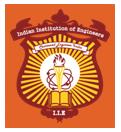THE ACADEMIC PROGRAMME OF THE INSTITUTION MAINLY CONSISTS OF SECTIONS ‘A & B’ EXAMINATIONS, POPULARLY KNOWN AS THE AMIIE EXAMINATION.
AMIIE in Electrical & Electronics Engineering
Information For:
- Home
- Examination
- R&D
- Application Status
- Apply Membership Online
- RTI Information & Reply
- Awards
- Become Student's Chapter
- Online Verification
- Placement Service
- Alumni Association
- Approval & Recognition
- AMIIE(B.Tech./B.E.)
- DIPIIE-DMIIE-TMIIE(Diploma)
- List of Student's Chapter
- Our Vision
- Circular/Notice/Tender
- Hall Ticket
- Examination Result
- Vacancy & Career
- Global Linkage
- Downloads
Key Highlights of the AMIIE
- Project based learning through industry collaborations.
- Focus on skill building & practical implementations.
- Interactive sessions with industry experts through Student's Chapter.
About
Electrical and Electronics Engineering (EEE) is a field that deals with the study and application of electrical systems, electronics, and electromagnetism. This branch combines electrical engineering, which focuses on electrical systems like circuits, power generation, and transmission, with electronics, which involves the design and development of devices and systems using electronic components. It covers various industries such as telecommunications, energy, and automation.
Career
Electrical and Electronics Engineering (EEE) offers a wide range of career opportunities across diverse industries. Graduates can work in power generation, telecommunications, automation, consumer electronics, and electrical systems design. EEE professionals can specialize in areas such as circuit design, robotics, renewable energy, microelectronics, control systems, and more. They may also pursue roles in research and development (R&D), project management, and teaching.
In the power sector, electrical engineers design, maintain, and optimize systems for electricity generation, distribution, and transmission. In telecommunications, they may work on designing and improving communication systems, including mobile networks and satellite communications. Robotics and automation industries also employ electrical engineers to develop systems and solutions for manufacturing and process control.
The growing emphasis on renewable energy, such as solar, wind, and electric vehicles, opens up new avenues for electrical engineers in sustainable technology and energy efficiency. Electrical engineers may also work as consultants, advising on infrastructure projects, safety standards, and energy usage. With advancements in technology, the demand for skilled electrical and electronics engineers continues to rise, ensuring promising career prospects and potential for growth in the field.
Job Prospects
Electrical and electronics engineers are in demand in power generation, telecommunications, and renewable energy sectors.
Opportunities exist in research and development, focusing on new technologies and innovations.
Graduates can pursue roles in automation, robotics, and control systems.
Teaching and consultancy roles in electrical engineering offer additional career paths.
Remuneration
Electrical and electronics engineers in India can earn an average salary of INR 3,00,000 to INR 7,00,000 per year, depending on experience and qualifications. Senior engineers and those in specialized fields can earn higher salaries, with some positions offering INR 10,00,000 or more annually.
Section-A
Section-B
- MICROPROCESSORS
- FLEXIBLE AC TRANSMISSION SYSTEM
- FUNDAMENTALS OF E.M. THEORY
- ELECTROMECHANICAL ENERGY CONVERSION - II
- CONTROL SYSTEMS
- ELEMENTS OF POWER SYSTEM
- ANALOG INTEGRATED ELECTRONICS
- EMBEDDED SYSTEMS
- POWER SYSTEM ANALYSIS
- POWER ELECTRONICS AND DEVICES
- ANALOG & DIGITAL COMMUNICATION
- SWITCH GEAR & PROTECTION
- ELECTRICAL INSTRUMENTATION & PROCESS CONTROL
- DATA COMMUNICATION NETWORKS
- VLSI DESIGN
- WIRELESS COMMUNICATION
- ANTENNA AND WAVE PROPAGATION
- POWER SYSTEM OPERATION AND CONTROL
- PROJECT WORK
What Is AMIIE?
Full form of AMIIE is “Associate Member of the Indian Institution of Engineers”. AMIIE is a professional certification given by Indian Institution of Engineers (IIE).

